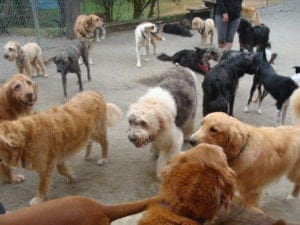Unmute the Commute: The Canine Commute
The Puget Sound region has grown quickly over the last 10 years. That means thousands more people are in cars headed to work. But there’s another population also sitting in traffic: dogs.
Bruno is one of those dogs sitting in traffic.
“Bruno is a dog that probably we should have called Clifford,” says Sydney Calvo – Bruno’s self-described dog guardian. “He’s not red, but sort of chocolate brown. He is probably the largest lab you may have seen in a while.”
Bruno’s day usually involves walking along the Puget Sound waterfront and cruising around with the family. Though, several times a week, he goes from his home in West Seattle to a doggie daycare 45 minutes to the southeast in Ravensdale, WA.
A dog shuttle picks Bruno up at 10 AM and takes him to a multi acre, forested property where he plays with other dogs.
Robert and Tiffany Berry own Super Fun Happy Dog, which runs this service. The couple started the business in 2001. At first, they were dog walkers in Seattle. But, in 2003, they moved out to the Ravensdale property where they could expand their business into what it is today.
“Some of these guys come out five days a week,” says Berry. “So, they know each other, they play together. Everyone has their place in the pack.”
About 50 dogs trot around the outdoor space, sniffing each other and engaging in playful skirmishes. Most of them arrive in white air-conditioned vans like the one Bruno came in.
“We on average have 16 to 17 dogs in each van,” explains Berry. “You’ve got to figure that on a daily basis there’s at least, in Seattle, several hundred dogs being transported around with the various companies.”
In the Seattle area, rates vary for dog daycare from less than $30 per day without shuttle service, to between $30 and $45 per day with shuttle service. In addition to daycare transportation, there are other businesses that take dogs and cats to the vet and the groomer.
“Back when I was younger, it was, you know, have the dog chained up in the backyard, keep them in the garage all day,” Berry says. “And now it’s hydrotherapy for dogs and raw food diets. I mean, these are people’s kids, right?”
Berry has grown close to many of his clients through working with their dogs and he’s been there through important life events.
“We’ve seen their kids grow up, we’ve been there when their parents have died, we’ve been the guys that pick up their dog when they give birth. You know we tell them to pack an emergency backpack for their dog just like they have an emergency backpack for the mom, you know, so we can just swoop in and grab the dog and leave,” he says.
While some dog owners are looking for a place for their pet to run, other city residents like to have their dog close to home. Some tech companies allow dogs in the workplace and badged employees are commonly seen in Seattle’s South Lake Union neighborhood with a dog in tow. There now seems to be a culture built around dogs in the workplace.
“If you come out here at lunch hour, it’s the new cigarette break,” says Elise Vincentini, owner of Downtown Dog Lounge. “It’s a nice healthy one. It’s take your dog out for a walk. It’s really fun to go out around 11 o’clock and see what everybody’s doing.”
At Amazon, there are around 6,000 dogs approved to be on campus. With that many dogs at work, some Amazon employees will seek out help with their pets.
“We offer a shuttle from Capitol Hill and all of the Amazon major locations, and we shuttle dogs from there to our space and then again in the afternoon we shuttle them back home,” says Vincentini. “When you’re urban living, it’s different. We don’t have all the options to run our dogs leash free or on a hike or things like that, so daycare is a necessity for some people.”
So, while their owners go to work, pets are also keeping a full schedule and joining the throngs of commuters making their way across town each day.
Produced by Jennie Cecil-Moore


